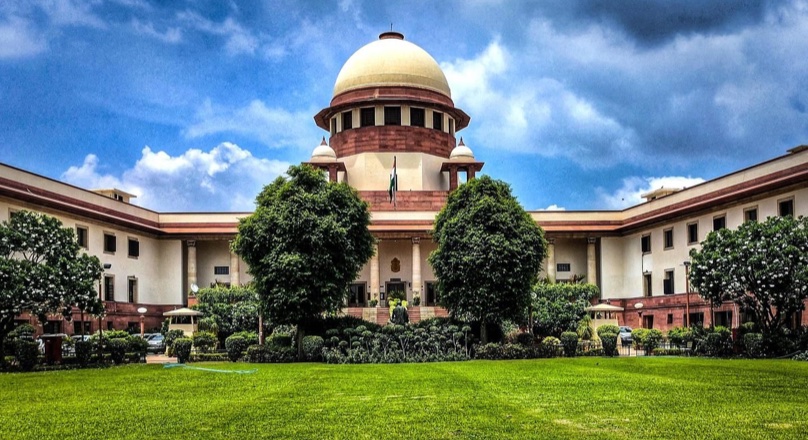The Court referenced factors such as the severe ramifications of unregulated corporate contributions and the voters’ entitlement to transparency regarding their electoral candidates.
On Thursday, the Supreme Court invalidated the electoral bonds scheme implemented by the Indian government in 2018, which allowed anonymous contributions to political parties.
A five-judge bench expressed the view that addressing black money in politics could be achieved through less drastic methods.
Two concurring opinions were issued: one by Chief Justice of India DY Chandrachud on behalf of himself and Justices BR Gavai, JB Pardiwala, and Manoj Misra, and another by Justice Sanjiv Khanna.
The key points of these perspectives are as follows:
Finances, Politics, and the Voting Rights
According to CJI Chandrachud’s viewpoint, a “significant connection” between finances and politics was acknowledged, emphasizing the importance of voters having access to information regarding political party funding to make informed voting decisions.
The Court elucidated that financial contributions to a political party could potentially result in quid pro quo agreements due to the intimate correlation between finances and politics.
Electoral bonds deemed excessively restrictive in combating black money
The disproportionate impact of the electoral bonds scheme was a significant factor leading the Court to invalidate it.
The Court observed that the electoral bonds scheme wasn’t the sole method for tackling black money in electoral financing. It noted the existence of alternative measures that have a lesser impact on voters’ right to information.
In essence, the Court found that the electoral bonds scheme lacked proportionality in its effect, as it failed to meet the “least restrictive means test.”
In his concurring opinion, Justice Sanjiv Khanna also extensively addressed the proportionality of the electoral bonds scheme. He concluded that the voters’ right to information outweighs the necessity for anonymity in political party funding.
“Access to information and the voters’ right to know are paramount in a democratic framework… While secret ballots are crucial for fostering free and fair elections, transparency—rather than secrecy—in political party funding is essential for ensuring fairness. The confidentiality of the voting booth does not extend to anonymity in contributions to political parties,” Justice Khanna asserted.
Why was the electoral bonds scheme entirely invalidated?
The Court highlighted that the sole distinguishing feature of the electoral bonds scheme from other donation methods (such as cheques, debit cards, etc.) was the “anonymity of the contributor.”
The Court explained that if the anonymity aspect of the scheme were nullified, “the Electoral Bond Scheme 2018 would consequently be deemed unconstitutional.”
Evidently arbitrary to permit unchecked corporate donations
The Court emphasized that corporate donors differ from individuals. Contributions from companies to political parties are viewed as “purely commercial transactions, undertaken with the aim of securing reciprocal benefits.”
Furthermore, the Court underscored that electoral bonds enabled even financially struggling companies to make undisclosed political contributions. This oversight disregarded the fact that financially distressed companies are more likely to engage in quid pro quo arrangements, the Court remarked.
Consequently, the Court concluded that the decision to allow corporations to make unlimited, anonymous political donations was clearly arbitrary and infringed upon Article 14 (right to equality) of the Constitution.
“The amendment to Section 182 (of the Companies Act) by permitting boundless corporate contributions enables companies to exert unbridled influence on the electoral process. This contravenes the principle of free and fair elections and political parity encapsulated in the concept of ‘one person one vote,'” the Court added.
The potential for donors to face victimization isn’t a valid justification for the electoral bonds scheme, according to Justice Sanjiv Khanna’s perspective.
Justice Khanna rejected the argument put forth by the Central government that the electoral bonds scheme aimed to safeguard political contributors from reprisals by parties in power due to the donors’ affiliation with a rival party.
Justice Khanna emphasized that transparency, not secrecy, is the solution and antidote.
“Maintaining secrecy imposes significant limitations and hampers the collective’s right to information and the right to be informed, which serve as checks and balances against instances of retribution, victimization, and retaliation,” the judge elaborated.
The judge further noted that political parties in power may still possess disproportionate access to information about donors held in banks. Consequently, the judge viewed the scheme as contradictory.
Brief concerns were also raised regarding the potential facilitation of money laundering.
“By ensuring anonymity, the policy ensures that money laundered as a result of quid pro quo or illicit connections remains concealed from public scrutiny,” the judge remarked.



